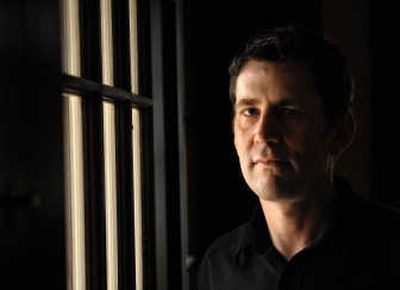Reading Spokane

Writers spend a lot of time by themselves, dreaming up scenarios that fill the books they want the rest of us to read. Then they go out to meet the public, trying their best to get us to pop $20 or $30 for the final product. Some writers love the sales process. Others loathe it.
Jess Walter has experienced all aspects of the writing trade, from writing all alone in his West Spokane neighborhood office to hitting the sales trail in bookstores across the country.
And this much he knows: What he loves best is simply addressing readers instead of trying to play the salesman.
“That individual experience with readers, when you’re not out there on book tour acting like a shoe salesman, for an author that’s the cool thing,” Walter says.
Walter, 42, whose Edgar-winning novel “Citizen Vince” is the focus of the sixth Annual Spokane Reading project, will meet with readers twice on Thursday.
At 1 p.m. he’ll appear at the North Spokane Library, 44 E. Hawthorne Road; at 7 p.m., he’ll do the same thing at the Masonic Temple, 1108 W. Riverside.
Both appearances are free and open to the public.
Spokane Is Reading began in 2002 as a joint project of regional libraries, bookstores and school districts. Its aim, following similar events in such communities as Seattle and Chicago, was to get the entire Spokane community to read the same book during the month of October.
That first book was Kent Haruf’s novel “Plainsong.” After a month’s worth of book discussions, Haruf – who lives in Colorado – came to read from his book at The Met (now the Bing Crosby Theater).
Haruf’s novel was followed by Charles Frazier’s “Cold Mountain” (2003), Orson Scott Card’s “Ender’s Game” (2004), Susan Vreeland’s “Girl in Hyacinth Blue” (2005) and, last year, Laurie R. King’s “The Beekeeper’s Apprentice.”
The project has been scaled back a bit for 2007. Now sponsored by the big three – Spokane Public Library, Spokane County Library District and Auntie’s Bookstore – Spokane Is Reading so far has hosted just three discussions.
A fourth is scheduled for 7 p.m. Oct. 23 at the Cheney Community Library as part of that branch’s regular reading group, while the Dark City Mystery Group will discuss the novel at 7 p.m. Monday at Auntie’s Bookstore.
Even so, as with all years but 2003 – when Frazier never even answered inquiring e-mails – the chosen author for 2007 will make himself available. And Walter will do so gladly.
When contacted on Wednesday, Walter was giddy about the good news involving another writer with Eastern Washington connections: It had just been announced that Wellpinit native, now Seattle resident, Sherman Alexie had been nominated for a National Book Award for his young-adult novel “The Absolutely True Diary of a Part-Time Indian.”
Walter, a finalist in 2006 for his novel “The Zero,” had called Alexie, who was in Miami on a book tour.
“He seemed really excited,” Walter said, adding: “Three Spokane guys in two years, though, that’s pretty impressive.”
Timothy Egan, a 1973 graduate of Gonzaga Prep, won the 2006 nonfiction National Book Award for “The Worst Hard Time: The Untold Story of Those Who Survived the Great American Dust Bowl.”
Walter, a known raconteur, likely will share stories of his own book-award experiences with those who show up on Thursday to hear him.
But he’s just as likely to tell stories of his growing up in the Spokane Valley; playing sports for East Valley High School; working as a reporter for The Spokesman-Review; covering the incident at Ruby Ridge that became his first book; turning to fiction to write three Spokane-based novels (“Over Tumbled Graves,” “In the Land of the Blind” and “Citizen Vince”); and receiving national acclaim for “Vince” and “The Zero.”
In fact, during a 20-minute phone interview, Walter is as likely to talk about the proposed movie plans for “Citizen Vince” (Billy Bob Thornton has expressed interest) as to speculate about how the book’s dark qualities differ from those of “The Zero.”
“I think the difficulty that a lot of people have with ‘The Zero’ is that it’s allegorical and open-ended, and that is a tougher read for most people, especially in an age in which people are reading fewer and fewer books,” Walter said.
“I think a book like ‘Citizen Vince,’ for me, is entertaining. It’s not work. And that, to me, seems like the right thing.”
Not only the right thing for a well-crafted book, but the right thing for the whole community to get behind.